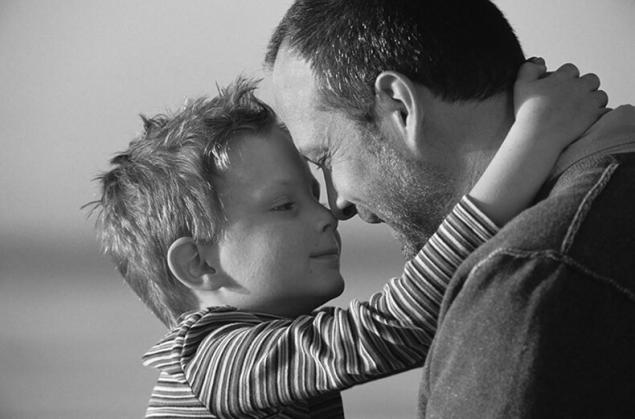378
Magic confidence: 3 IMPORTANT rules of communication with child
We often treat children as if all knowledge and understanding about life, about right and wrong, were only in our barrel experience. And the barrel of a child is empty, and longs to fill our thoughts and our experiences. But one ugly day we notice, what we hear from a child: "Fine." "Yes, ate", "a" b "in algebra", "Nothing interesting." And – he closes the door not only to your room, but in your inner world.

The FIRST RULE of magic through communication – to find out. Throw away from conversations all the questions that we ask every day. No more: How you doing? How was school? What grades? Ate. How many will come? Did you clean your room? Forgot these formulations. They are not. So it is necessary for the miracle.
This applies not only to the parents. We rarely ask loved ones about what they would like to tell us. It is important only that interests us. Because not only do we lose contact with the child, but the love of a partner, respect, trust, interest, the value of proximity.
Ask questions. Look, nodding, no distractions, and ask probing questions further.
Check. Ask. You may think that we are sincerely interested in the life and opinion of your close person, but he can learn about it only one feature: you or ask him, keeping the conversation further questions, or limited duty "how are you?" and miss the answer by ear, so it means you are not interested.
After a couple of months of this practice of active listening between the two of you will form a completely different space. The child all the time thinking of something. Something feels. Is afraid of something and wants something. Don't need in the first minute, neither the twentieth – to summarize, to throw in my two cents opinion, to estimate, to alter. You only need to perceive it. Zero interference. Only interest, only the questions and attention.
Then the magic begins.Once people understand and believe that you have a sincere interest, he will begin to trust, to share, to open, will cease to filter information, to divide it into "can I say" and "she or he will not understand."
We are happy when we have someone with whom you can share even small things. We are happy if someone is after the question "How are you?" ask also "why? What happened? What do you feel? Why do you think so? And what do you dream? How do you see this situation? What do you dislike? And show me! And what you want to do with this?"
With such people we are pretty fast to open, call them their loved ones, dowery them. When we live with a partner a year or five or ten, we move to a completely everyday life. Life – our space. And we all know where that leads, if the conversation will eventually boil down to "don't forget to throw out the garbage."
With a child — is even more important not to slide into the life and formality. Even if you're a parent, you play with the baby for an hour or two a day, be touched and be proud of them, still the main topics of your talk – the life and training, your demands or requests, your questions often relate to outcomes, not processes.
Often talk about a stranger, not about home and school; any transmission on television, an interesting site, funny picture – show, share on social media, call to see, ask for advice in the selection, and most importantly – ask, ask, ask. Music, movies, games, social networks, new and old friends, whose conflicts, sympathy and gossip. Oddities teachers and classmates.
Fun. News. Open. Jokes. Dreams. You will be surprised how much your child knows, how the world has changed in ten years. So become friends. Because a friend is a person you genuinely interesting.
SECOND – no estimates. Especially critical. Having received the answer, you need to handle it very carefully. Any assessment can once and for all discourage the desire to share.
The error say: Yes, I have the same (or Vice versa) and then a long, long story about myself. About their reasons, their stories. Remember – you have three minutes on a story about yourself, an interesting story that highlights your interest and your acceptance of the position of the child or explains an alternative position.
Better if it will be something honest, personal, perhaps even coloring you. Nothing to worry about. Laugh at yourself, you only increase the confidence. The last word leave him. For greater efficiency – removing arrogance "adult smart" and listen as listened to, say, an elderly companion. You can't kill postoronnii words "What nonsense!" or "how can you say that!"

THIRD (if we are talking about problems), to know his vision of the solution. His role models. His methods are. Fears. Concerns. Hope. His "right" and "wrong". If you do not agree with his decision, offer his own, but as a friendly advice, explaining why you believe your solutions more efficient. And again – the last word for him.
Three rules: Ask as much as possible. Not to appreciate. Do not decide for others.
Spend in this mode at least three weeks. It is believed that 21 days is the minimum period in order to find a new habit, or to abandon old ones. And if you survive three weeks, you'll see a magical result. A child who had limited to answers "Fine" and "I did algebra," turn into a man who asks you for advice on very personal matters. With the rest of the family members these three rules work more magical. You can change everything just ceasing to be such as yesterday.published
Author: Leah Sharova
P. S. And remember, only by changing their consumption — together we change the world! ©
Source: www.facebook.com/pereval.org/posts/1238930082810663:0

The FIRST RULE of magic through communication – to find out. Throw away from conversations all the questions that we ask every day. No more: How you doing? How was school? What grades? Ate. How many will come? Did you clean your room? Forgot these formulations. They are not. So it is necessary for the miracle.
This applies not only to the parents. We rarely ask loved ones about what they would like to tell us. It is important only that interests us. Because not only do we lose contact with the child, but the love of a partner, respect, trust, interest, the value of proximity.
Ask questions. Look, nodding, no distractions, and ask probing questions further.
Check. Ask. You may think that we are sincerely interested in the life and opinion of your close person, but he can learn about it only one feature: you or ask him, keeping the conversation further questions, or limited duty "how are you?" and miss the answer by ear, so it means you are not interested.
After a couple of months of this practice of active listening between the two of you will form a completely different space. The child all the time thinking of something. Something feels. Is afraid of something and wants something. Don't need in the first minute, neither the twentieth – to summarize, to throw in my two cents opinion, to estimate, to alter. You only need to perceive it. Zero interference. Only interest, only the questions and attention.
Then the magic begins.Once people understand and believe that you have a sincere interest, he will begin to trust, to share, to open, will cease to filter information, to divide it into "can I say" and "she or he will not understand."
We are happy when we have someone with whom you can share even small things. We are happy if someone is after the question "How are you?" ask also "why? What happened? What do you feel? Why do you think so? And what do you dream? How do you see this situation? What do you dislike? And show me! And what you want to do with this?"
With such people we are pretty fast to open, call them their loved ones, dowery them. When we live with a partner a year or five or ten, we move to a completely everyday life. Life – our space. And we all know where that leads, if the conversation will eventually boil down to "don't forget to throw out the garbage."
With a child — is even more important not to slide into the life and formality. Even if you're a parent, you play with the baby for an hour or two a day, be touched and be proud of them, still the main topics of your talk – the life and training, your demands or requests, your questions often relate to outcomes, not processes.
Often talk about a stranger, not about home and school; any transmission on television, an interesting site, funny picture – show, share on social media, call to see, ask for advice in the selection, and most importantly – ask, ask, ask. Music, movies, games, social networks, new and old friends, whose conflicts, sympathy and gossip. Oddities teachers and classmates.
Fun. News. Open. Jokes. Dreams. You will be surprised how much your child knows, how the world has changed in ten years. So become friends. Because a friend is a person you genuinely interesting.
SECOND – no estimates. Especially critical. Having received the answer, you need to handle it very carefully. Any assessment can once and for all discourage the desire to share.
The error say: Yes, I have the same (or Vice versa) and then a long, long story about myself. About their reasons, their stories. Remember – you have three minutes on a story about yourself, an interesting story that highlights your interest and your acceptance of the position of the child or explains an alternative position.
Better if it will be something honest, personal, perhaps even coloring you. Nothing to worry about. Laugh at yourself, you only increase the confidence. The last word leave him. For greater efficiency – removing arrogance "adult smart" and listen as listened to, say, an elderly companion. You can't kill postoronnii words "What nonsense!" or "how can you say that!"

THIRD (if we are talking about problems), to know his vision of the solution. His role models. His methods are. Fears. Concerns. Hope. His "right" and "wrong". If you do not agree with his decision, offer his own, but as a friendly advice, explaining why you believe your solutions more efficient. And again – the last word for him.
Three rules: Ask as much as possible. Not to appreciate. Do not decide for others.
Spend in this mode at least three weeks. It is believed that 21 days is the minimum period in order to find a new habit, or to abandon old ones. And if you survive three weeks, you'll see a magical result. A child who had limited to answers "Fine" and "I did algebra," turn into a man who asks you for advice on very personal matters. With the rest of the family members these three rules work more magical. You can change everything just ceasing to be such as yesterday.published
Author: Leah Sharova
P. S. And remember, only by changing their consumption — together we change the world! ©
Source: www.facebook.com/pereval.org/posts/1238930082810663:0























